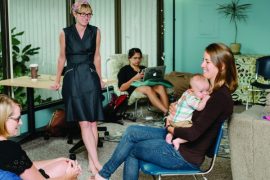By Katy Macek
For Latia Warren, a fulfilling career meant running her own business. But making the leap from working a comfortable corporate job with a steady income to the uncertainty of starting something from scratch was daunting for the mother of three.
After putting it off for years, she quit her banking job in 2018 and went to school to become a licensed esthetician, while working two part-time jobs.
She opened La’Karron Beauty Elements, a business offering facials, waxing, eyelash extensions and teeth whitening services, two days after graduating — though she still worked another part-time job as a safety net. She was also introduced to Wisconsin Alumni Research Foundation’s UpStart, a free entrepreneurship training program for women and people of color.
As Warren’s business grew. She quit her part-time job and was able to focus on La’Karron full-time.
Fortunately for others looking to monetize a hobby or transition a side hustle into a full-time job, the Madison area is filled with resources. Here are some things to consider.
UNDERSTAND YOUR FINANCIAL PICTURE
Katie Rice, UpStart’s director, says finances are key. Create checking accounts for your personal and business banking — and keep them separate.
Talk to a financial advisor about what financing options are available, including small business loans and other sources of funding.
But don’t let access to capital prevent you from trying. Warren didn’t have seed money, clientele or resources when she started her skincare business — but she worked the connections she had.
She asked her loved ones if they were buying gifts for her to purchase things for her business instead.
“I made an Amazon gift list, and the blessings started rolling in,” she says.
Rice says it’s also important to talk to an expert about logistics, including small business tax requirements and insurance. Having this squared away up front creates a solid, less stressful foundation moving forward.
MAKE (OR LEVERAGE) YOUR CONNECTIONS
Rice says to seek out other entrepreneurs and learn from them.
“It’s really helpful to hear how others have succeeded and failed, things to avoid and [what you should] double down on,” she says.
Kristin Graves started KMGhandmade, a custom handbag and sewing pattern business, as a side hustle in January 2021, and found a wealth of knowledge in local Facebook groups. Those people became friends and mentors, offering advice on how to create her own sewing patterns and how to set up a Shopify site for her business.
For Warren, she viewed everyone as a resource. The woman who did her eyelashes, for example, told her about business licensing.
“I started telling everyone I was going to [start my own business], and the pieces started falling into place,” she says.
UNDERSTAND THE COMMITMENT
Graves, who loves her full-time job and also enjoys her side hustle, has a structured schedule. She works her full-time gig until 4 p.m. daily, and tackles KMGhandmade tasks on nights and weekends.
“I would say I probably have two full-time jobs, if I’m realistic,” she says.
Josey Chu was a nurse when she and her husband, Ben Johnson, made the decision for Chu to quit her job in 2021 to focus on her burgeoning Southeast Asian condiment company because friends kept inquiring where they could buy her sambal nyonya (a red chili paste).
Quitting her nursing job to focus on what she eventually named Madame Chu Delicacies “really did reduce my stress and anxiety,” Chu says. “It also allowed me to spend more time, get more education and training … and grow the business.”
TAKE ADVANTAGE OF LOCAL RESOURCES
Places like UpStart can help entrepreneurs understand what it takes to start a business. UW-Madison’s Small Business Development Center also offers classes and workshops for business planning.
The Progress Center for Black Women, Urban League of Greater Madison, SCORE Madison and the Wisconsin Economic Development Corporation are other resources. The website capitalentrepreneurs.com offers a comprehensive list of resources in the Madison area.
Shared equipment can also save on costs. Chu, for example, rented space in FEED Kitchens, a shared commercial kitchen, to make her products. Madison also has several coworking spaces.
Chu also sold her products at Culture Collectives, a city- run collection of pop-up shops that gives entrepreneurs a taste of what it’s like to have a physical location on State Street.
“[In Madison] you have organizations [and] networks that can help,” Chu says. “You couldn’t find a better place to give it a try.”
THREE QUESTIONS TO ASK ABOUT YOUR BUSINESS
Katie Rice, director of Wisconsin Alumni Research Foundation’s UpStart, says it’s important to write down key pieces of information about your business, including (but not limited to):
- What’s the product?
- What’s your value proposition?
- Who are your customers?
Rice suggests doing research on the market you’re going into – figure out how your product will be received, and if people will pay for it.
Josey Chu of Madame Chu’s Delicacies says her biggest advice for other entrepreneurs is to understand the target customer.
“It was a lot of trial and error, but I did know not everybody was my customer,” she says. “Then, you [can figure out how] to reach them and can build trust.”




